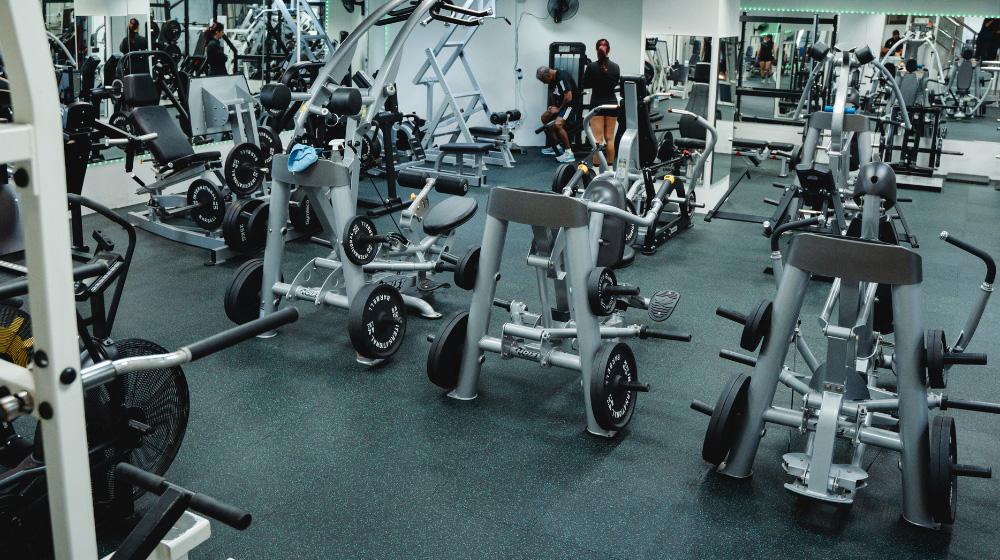Setting up a gym in Singapore can be a rewarding venture, but it requires meticulous planning and a deep understanding of the local fitness market. In Singapore, there is an increasing focus on health and wellness, with the demand for fitness centres on the rise. In fact, from May 2019 to May 2022, our little red dot saw a 6% rise in the number of people working out in ActiveSG gyms.
However, the market is also becoming increasingly saturated, making it essential to stand out with a unique value proposition. The big question remains: is doing a gym business profitable?
To answer that question, I spoke with industry veterans Gareth Fairhead and Harvey Mercado from Unreal Personal Training, a personal training gym in Singapore.
In this exclusive guide, we explore the key steps to successfully opening and setting up a gym business in Singapore.
From developing a solid business plan and choosing the right location, to understanding legal requirements and creating a strong online presence, this article provides a comprehensive roadmap to help you navigate the challenges and opportunities of establishing a successful gym in Singapore.
Whether you're a fitness enthusiast looking to turn your passion into a business or an entrepreneur seeking a profitable investment, this guide will equip you with the knowledge and tools needed to thrive in Singapore's dynamic fitness industry.
Why open a gym in Singapore?
Gareth has always been quite active and sporty, with a strong involvement in strength training. After moving to Hong Kong, he injured himself and during his recovery, he reached out to a personal training gym that had personal trainers who were trained in injury rehabilitation.
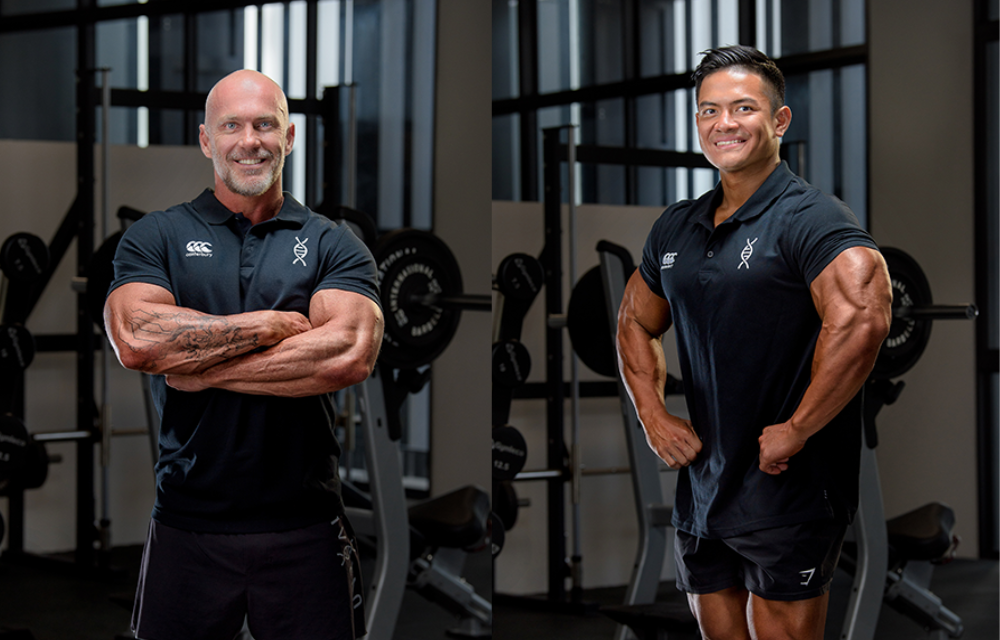
His experience helped him become pain-free and strong again, igniting a desire to give back to the community. This motivation, in turn, led him to focus on improving the skillset of training and nutrition, aiming to push the local fitness industry in Singapore beyond its current state.
Harvey adds that at Unreal Personal Training, they are confident in their product and the experiences they offer their clients. They pride themselves on providing personalised experiences to all their clients, avoiding a one-size-fits-all approach. Each program is tailored based on the individual goals of their clients, and they work together to achieve them.
Gareth highlights that many fitness businesses in Singapore measure success in terms of visual transformations, showcasing before and after results. This approach is more marketable and visually appealing, but Unreal Personal Training focuses on the holistic improvement and personalised progress of its clients.
Unreal Personal Training was thus birthed with the mission to be a gym that focuses on imparting knowledge, and educating clients to promote sustainable and long-term fitness.
Is owning a gym in Singapore profitable?
Gareth explains that the fitness market in Singapore has become very saturated over the last couple of years. There are different modalities available, ranging from gyms specialised in specific equipment to those focused solely on body movements. These range from barre and pilates studios to group training studios like BFT and F45.
A lot of these specialised fitness facilities often capitalise on short-term trends, lasting about two to four years before the owners exit the space. On top of that, it can be relatively easy to open a low-cost entry gym.
So in simple terms, yes, it can be profitable to own a gym in Singapore.
That said, setting up a gym like Unreal Personal Training, which offers a unique and specialised experience, is quite challenging in the current market given that rentals and the cost of importing gym equipment are at an all-time high.
For those looking for long-term success, he also advises against approaching fitness franchises and business models based on trends and fads.
How to set up a gym in Singapore?
Develop a Business Plan
1) Building the Business Foundation
Unreal Personal Training was originally founded by three business partners who already had a freelance client base.
Gareth initially had three business partners who had a freelance client base. They gathered personal trainers with clients to gauge potential revenue. From this, they estimated an affordable rental fee based on the total hours the trainers worked and the money they earned.
As a business, they offered higher commission rates for their founding trainers, but this proved unsustainable as the costs became challenging to long-term sustainability.
Maxed-out commission rates from employment on the get-go also offered less room for trainer salary progression. So they revised their model to create a progressive structure that allowed for trainer progression and more predictable business growth.
2) Decide on a business name
Choosing a good business name for a gym in Singapore is crucial for establishing a strong brand identity and attracting customers. A well-chosen name can convey the essence of your gym's offerings, values, and target market, helping to differentiate it from competitors in a crowded fitness industry.
GoDaddy’s domain name generator helps you easily come up with a catchy business name.
It should be memorable, easy to pronounce, and reflective of the gym's unique selling points, whether that be state-of-the-art equipment, specialised classes, or a community-focused atmosphere. A strong business name also plays a significant role in marketing efforts, making it easier to create a cohesive and compelling brand message across various platforms.
3) Target Audience: Sustainable Fitness
Harvey, coming from a corporate background, understands that people need to feel a deeper sense of connection when working in the gym. He emphasises the concept of "Ikigai" – a motivation for coming to work. He found that holistic development offers more satisfaction than just physical transformation.
The goal is not only to transform physically and mentally but also to learn how to sustain these changes. Harvey highlights that there is life beyond achieving a six-pack, and it is important to complement one's lifestyle.
Educating clients fosters a holistic approach for both trainers and clients, developing long-term partnerships. Clients who have been training for 3-5 years experience a healthier relationship with the gym and their food choices, balancing enjoyment and results.
Gareth noticed that retention rates are higher when the focus is not solely on transformation. He also mentions that Unreal Personal Training places emphasis on the specificity of the equipment, carefully selected and designed by athletes to cater to all types of clients.
4) Financial Projections and Sustainability
When they opened Unreal Personal Training, the model worked, and they had the opportunity to either take the capital back or expand. They chose to expand, but then COVID-19 hit, resulting in debt. Gareth explains that they examined the final details to understand their expenses, client influx, and individual trainer costs per hour to see how much each contributed to the business.
They developed sustainable promotions and focused on key metrics such as the number of hours worked based on seasonality to predict and project finances. Being diligent and cautious about costs and spending was crucial.
Gareth also notes that it’s important to be cautious about heavy discount promotions as an acquisition strategy, otherwise profitability can suffer at the expense of client acquisition. Harvey adds that client travel schedules have stabilised post-COVID border reopenings, with people having more predictable gym routines than 12 months ago.
5) Internal management and tools for efficiency
Harvey humorously mentions that they explored Timely, a CRM tool for hair salons. However, they eventually chose B-Sport to manage sales and purchases. This tool also helps with calculations and invoice management.
Gareth explains that while many studios use apps for bookings, their gym allows personal trainers to manage their schedules personally. Using scheduling tools approach prevents appointment scheduling from disrupting personal conversations with clients on WhatsApp.
Determine your capital requirements
1) Rental, utilities, and renovation
Opening a gym in Singapore requires meticulous planning and budgeting to manage both startup costs and ongoing expenses. One of the primary expenses is the rental cost for a commercial space. In Singapore, rental prices for a suitable gym location can range from SGD 8 to SGD 15 per square foot. For a 9,000-square-foot space in the CBD, you could be looking at a monthly rental cost of between SGD 20,000 to SGD 50,000. Additionally, utilities such as electricity, water, and internet can add another SGD 3,000 to SGD 7,000 per month to your expenses.
The initial investments covered several key areas including equipment costs, which can range between SGD 50,000 to SGD 100,000, and renovation costs, which can amount to around SGD 20,000 to SGD 50,000 depending on the extent of the work required. Additionally, securing the necessary business licenses and permits in Singapore can cost around SGD 1,000 to SGD 2,000.
2) Manpower
Hiring qualified staff is another critical aspect of opening a gym. The costs associated with hiring personal trainers, front desk staff, and maintenance personnel must be taken into account. Salaries for experienced, high-quality personal trainers in Singapore can be upwards of SGD 3,000 to SGD 6,000 per month, while administrative and support staff salaries can be anywhere upward of SGD 2,000 to SGD 3,500 per month.
Harvey emphasizes the importance of hiring and retaining passionate and experienced trainers who can provide personalised experiences to clients. This approach ensures that clients receive tailored programs based on their individual goals, fostering long-term relationships and client retention.
Securing funding
Finding investors who share your vision and passion for fitness can significantly ease the challenges around setting up the business for success. A well-prepared business plan that outlines your goals, market research, and financial projections will be instrumental in attracting investors.
It’s essential to ensure that potential investors understand the long-term vision and sustainability of the gym. Harvey emphasizes that having a strong, clear vision helps in having investors buy into the potential for success and sustainability.
Gareth shared their experience of starting Unreal Personal Training with three initial investors who were the original shareholders, Gareth included. Among them was Gareth’s former trainer, who was passionate about elevating industry standards, and another friend who was keen on the venture. These passionate athletes pooled their resources to cover the initial funding necessary to kickstart the gym.
Legal requirements for opening a gym
When opening a gym in Singapore, there are several legal requirements you need to address. First, you need to choose a business structure, such as a Limited Liability Company (LLC), sole proprietorship, or corporation.
Register your business with the Accounting and Corporate Regulatory Authority (ACRA) and obtain the necessary permits. Additionally, you must identify the required licenses for gyms, which may include a health club license and a copyright license for any music played in your gym. It's also essential to secure the appropriate types of insurance, such as general liability, workers' compensation, and commercial property insurance.
Ensuring you meet all legal requirements should be among the first steps you take when running any business.
Gareth explains that in Singapore, to open a fitness studio or gym, you must ensure that the space is suitable for the intended use and obtain approval from the Urban Redevelopment Authority (URA). You will also need to secure insurance, with a requirement of a $2 million limited liability policy.
Landlords often require a minimum of $1 million insurance liability. Additionally, every business must have a director residing in Singapore. While there are no specific legal standards for trainer qualifications in Singapore, having qualified trainers is beneficial for your gym's reputation and client trust.
Gareth emphasises that there aren't many stringent legal requirements specifically for fitness businesses in Singapore, as it relates to “trainer qualifications”. However, adhering to the general business and safety regulations is crucial for smooth operations and to avoid any legal issues. Ensuring compliance with these regulations will help you build a reputable and trustworthy gym.
By understanding and addressing these legal requirements, you can establish a solid foundation for your gym business in Singapore. This preparation will allow you to focus on providing excellent service to your clients and growing your business.
Finding the right location
When opening a gym in Singapore, finding the right location is crucial. Consider factors such as zoning laws, proximity to other gyms, and accessibility. Ensure that the premises are zoned for commercial use and meet all building codes to avoid legal complications.
Gareth explains that their initial choice of location was not based on foot traffic but on where their then-client base was situated. They also had to consider the space rental costs, which played a significant role in their decision.
Once the business started to gain traction, they sought a more appealing and strategically located space. Gareth mentions that they considered areas like Bukit Merah and Holland Village, but ultimately, for personal training in Singapore, the demographic at that time was more affluent corporate workers. However, the target demographic has since expanded to include a broader audience who understands the importance of health and fitness.
By carefully selecting a location that aligns with your target demographic and business model, you can set your gym up for success. It’s essential to balance cost, accessibility, and the needs of your potential clients to find the perfect spot for your gym.
Setting up your gym
Equipment is selected by the team of trainers who are athletes themselves. Curated equipment to target specific and optimal biomechanics when training different muscle groups, and a range of client types - from novices to bodybuilders.
Safety is a key consideration when setting up your gym in Singapore.
The layout is a mix of safety, fit, aesthetics, and ensuring efficiencies during a training session. Avoiding clients and trainers from walking across the whole gym floor between sets. And giving enough space in walkways for people to move and navigate the space.
Set up a website
Having an online presence is crucial in today's digital age, especially for a gym business. A well-designed website serves as the face of your gym, providing potential clients with their first impression of your services. It helps build credibility, attracts new clients, and provides existing members with essential information. A strong online presence also enhances your gym's visibility on search engines, making it easier for people to find you.
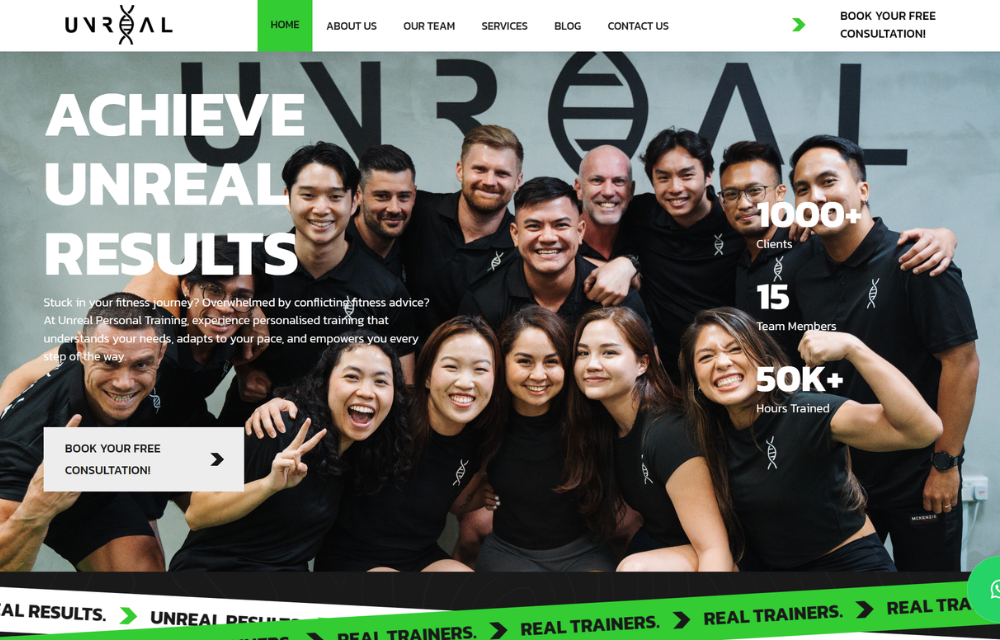
A well-designed site is vital as it reflects the professionalism and quality of your gym. It should be user-friendly, visually appealing, and mobile-responsive to ensure a seamless experience for all visitors.
GoDaddy’s website builder helps all business owners easily establish an online presence.
An aesthetically pleasing and functional website can significantly influence a potential client's decision to choose your gym over others. Investing in good web design also means your site can effectively convey your brand's message and values.
Your homepage should include essential information to engage visitors and convert them into clients. Key elements to feature are a clear and concise description of your gym, the services offered, membership options, and contact information.
Additionally, including client testimonials, high-quality images of your facilities, and an easy-to-navigate class schedule can help visitors quickly find what they need and feel more confident in choosing your gym.
Market your gym
Effective marketing is essential for attracting clients and growing your gym business. Actively posting on social media platforms can help create brand awareness and engage with potential clients.
Getting a domain from a registrar like GoDaddy is the first step to an effective SEO strategy and establishing an online presence.
Running promotions, such as unlimited access offers and early sign-up bonuses, can entice new members to join. Establishing an online presence through a domain from providers like GoDaddy is crucial for search engine optimization (SEO) to ensure your gym is easily found online.
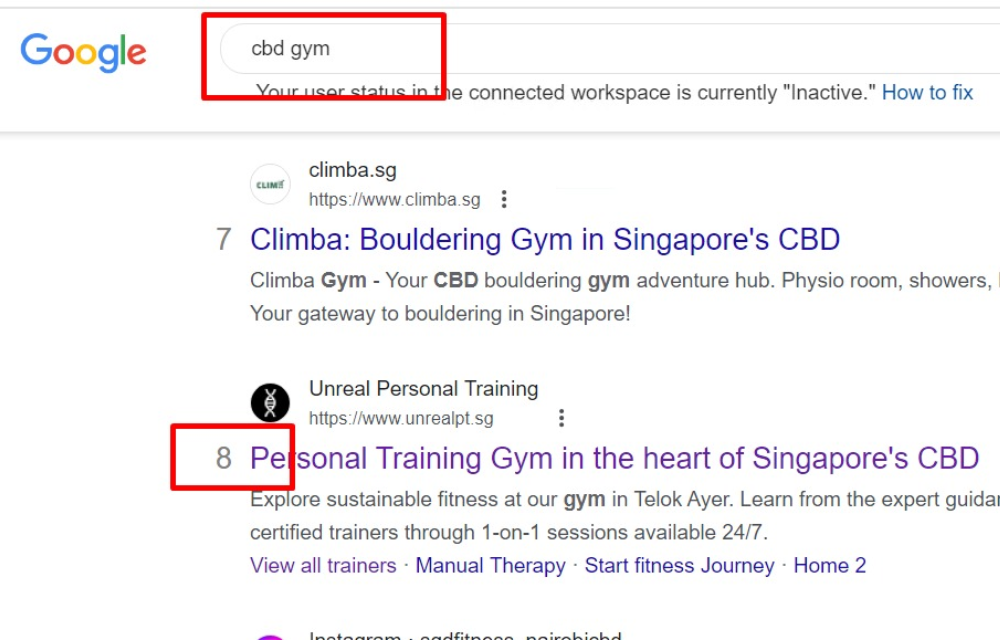
Gareth emphasises the importance of SEO, sharing that it has generated seven leads for their gym. Client acquisition has been very successful through word-of-mouth and referrals. Social media marketing is vital for ensuring a consistent brand image and feel.
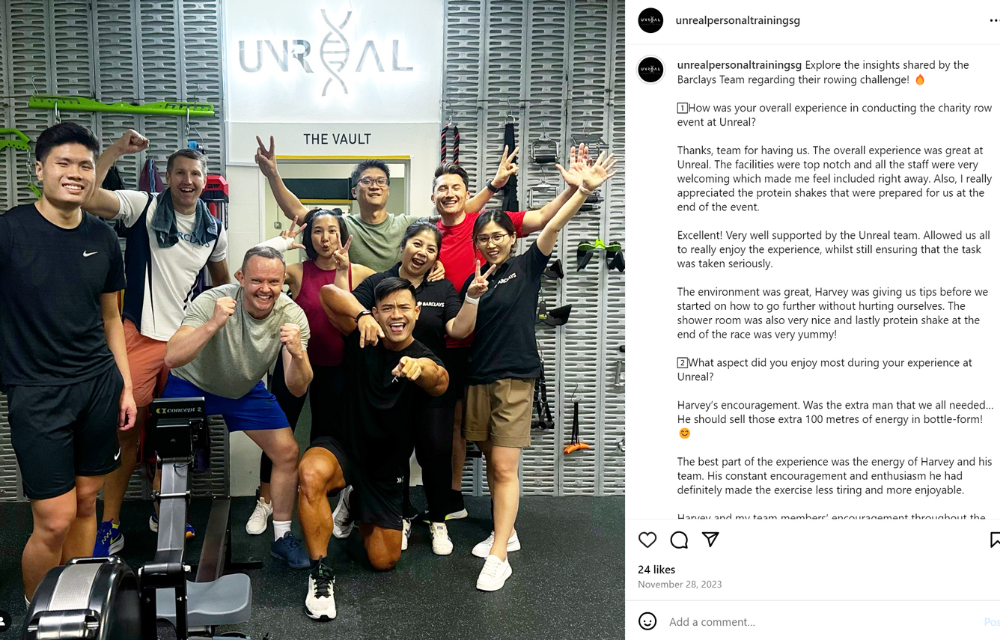
While growth via social media comes mainly from promotions, it is not the primary method of client acquisition. Social media also provides a glimpse into what it’s like to be part of Unreal Personal Training, catering to the trainer community, current members, and potential clients.
Google reviews are another important aspect of their marketing strategy. Gareth mentions they are considering club sponsorships and partnerships, with other fitness providers and health & wellness facilities that will compliment Unreal Personal Training offerings to their clients, for cross-promotions and branded supplements.
By leveraging various marketing channels and focusing on creating a strong online presence, you can effectively attract and retain clients for your gym. Consistency in branding and actively engaging with your community are key components of a successful marketing strategy.
Staffing your gym
Gareth explains that their team has evolved over time. Initially, they started with a group of freelancers who were primarily bodybuilders. This appealed to a specific segment of clients. However, as the business grew, they transitioned to hiring new, younger trainers eager to learn about the fitness space.
Whilst some attrition happens, they find that trainers from diverse backgrounds, and who may have come from corporate careers, or turned a hobby into a passion and career, were more relatable to clients. These trainers understood the stresses of everyday life, including the challenges of maintaining a healthy diet and lifestyle. Their current hiring focus is on hiring trainers who understand the rationale for joining the fitness industry and are open to unlearning non-scientific methods in favour of a more holistic approach.
Harvey adds that they now hire trainers with varied skill sets. They agree with Gareth on the importance of hiring based on values and beliefs rather than just experience. They are willing to hire people with no prior experience as long as they are focused on client success and learning the science and craft of being a personal trainer, technical skills can always be taught.
Hiring based on values and beliefs is more effective than hiring based on skills.
Values and beliefs, however, cannot be imparted. This approach ensures that new hires can easily integrate with the team, enjoy their work, and align with the company's values. Additionally, they emphasise that trainers must pass a rigorous evaluation to ensure they truly embody the principles they teach.
Gareth highlights the importance of matching clients with trainers from diverse backgrounds to ensure a good fit. When choosing certifications for trainers, they prefer Pre-Script® due to its comprehensive philosophy. Other certifications like AFA, ACE, NASM, OPEX, along with MNU, Precision Nutrition or SNA nutrition courses, are also considered.
The applicability of the knowledge to specific training needs, such as bodybuilding preparation or barbell training, is a key factor in their selection. Ensuring that the certifications contribute to the trainer's development and, subsequently, to client benefits is crucial. Anyone who joins their team needs to be certified, reflecting their commitment to maintaining high standards.
Ensure consistent learning and training within the team
Continuous learning and professional development are crucial for maintaining a high standard of service in your gym. More experienced coaches play a pivotal role in this process by sharing their knowledge and expertise with the team through regular sessions.
Harvey emphasises the importance of focusing on education, noting that trainers need coaches too. If a trainer claims to know everything, it’s a red flag because the fields of fitness and nutrition science are constantly evolving. To keep up with these changes, they hold weekly seminars divided into four segments.
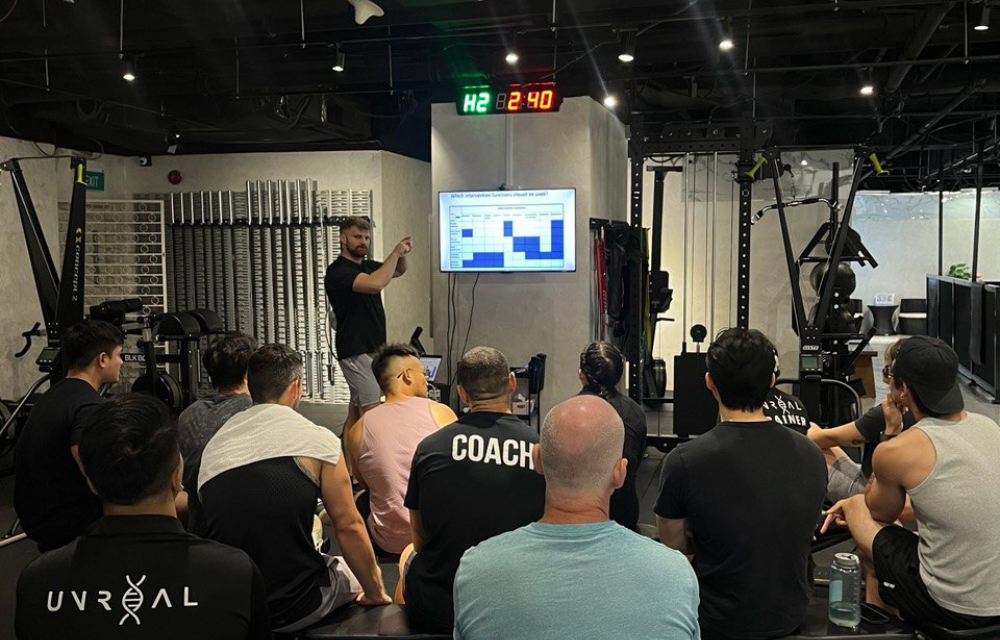
The first segment, "Art of Coaching," focuses on soft skills essential for effective coaching. This segment is led by Dylan, who has 16 years of experience, and Harvey, who brings a wealth of knowledge from his corporate and educational background, including lecturing at the National University of Singapore (NUS) in philosophy and history.
The second segment, "Exercise and Programming," is spearheaded by Yang, who has completed the Pre-Script programming course. This segment aims to coach trainers on exercise selection and effective programming strategies to enhance their clients' fitness journeys. Stuart, who is pursuing a Master of Science in strength and conditioning, also contributes his insights.
The third segment, "Nutrition," is led by certified nutritionists Naz and James. They provide guidelines and insights based on bloodwork and the latest nutritional science, helping trainers offer evidence-based nutritional advice to their clients.
The final segment involves "Case Study Sharing," where trainers learn from real client cases. This collaborative approach allows the team to discuss and resolve various client scenarios, enhancing their practical knowledge and problem-solving skills.
By fostering a culture of continuous learning and collaboration, you can ensure that your team remains at the forefront of the industry, providing the best possible service to your clients.
Final thoughts on starting a gym business
Starting a gym business in Singapore requires careful planning, a clear vision, and a commitment to continuous learning and improvement. Key steps include conducting thorough market research, choosing the right location, and ensuring legal compliance.
It's essential to secure initial funding and manage ongoing expenses, including rental costs, utilities, and hiring qualified staff. Gareth and Harvey’s experience highlights the importance of focusing on personalised client experiences, leveraging SEO and social media for marketing, and fostering a culture of education within the team. These elements are crucial for building a sustainable and successful gym.
Aspiring gym owners can take inspiration from Gareth and Harvey's approach, which emphasises the significance of values, continuous professional development, and client-centred services. Utilising additional resources, such as professional certifications and networking opportunities, can further enhance your business's growth.
GoDaddy can play a vital role in this journey by providing essential services like domain registration and SEO support, ensuring your gym has a robust online presence. This foundation will help attract and retain clients, driving your gym’s success in Singapore’s competitive fitness market.
Reach out to GoDaddy to start your entrepreneurial journey today!
